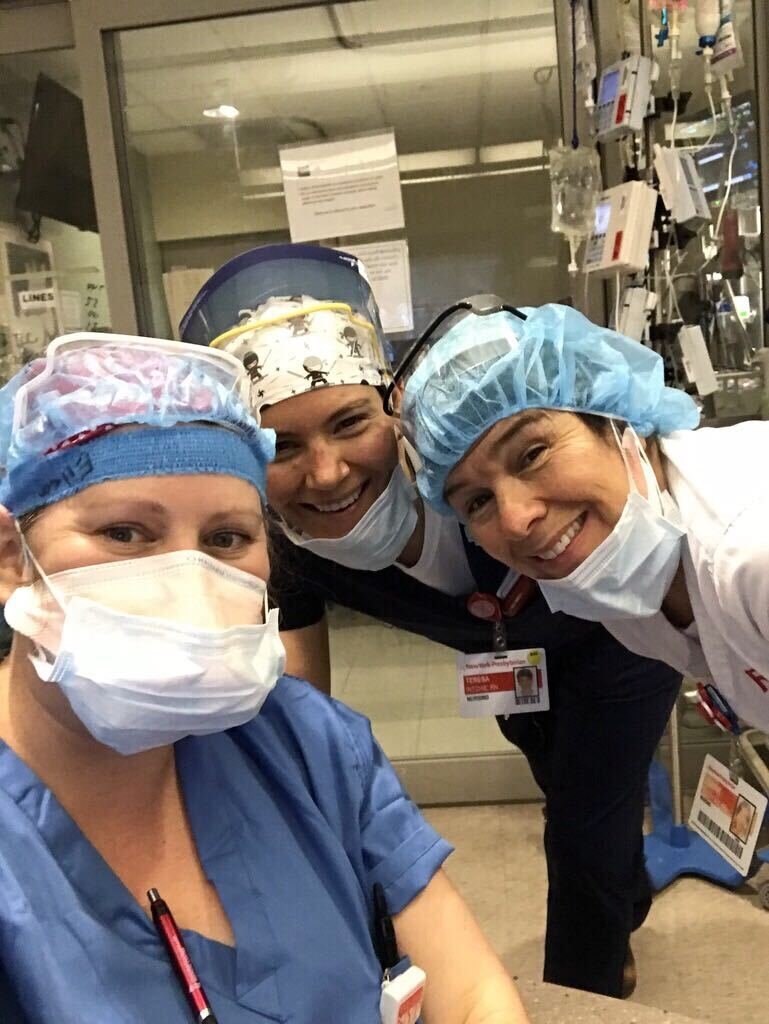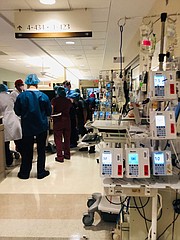Teresa Ritchie left Stillwater for New York City. As an ICU nurse in the float pool, she would go to the ICU that needed extra help. Some days it was the burn unit. Others, it was surgical or neuro.
Ritchie admitted she finally discovered a job she couldn’t handle. Working in the burn unit proved a bit much.
“It’s bad. I couldn’t do it. It was just too much,” she said. “In the city, you see a lot of, like, fire burns. A lot of firefighters come in with burns and they’re in so much excruciating pain. The dressing changes you have to do … it’s just a lot. I said, ‘you know maybe this is not the right thing for me.’ Let me look for something else. It’s just too much, too painful. I wanted something a little bit different.”
Though the burn unit wasn’t permanent for her, Ritchie did have to handle the job at times. Keeping a straight face and a calm demeanor for the patient was something she had to do, even if her insides were bubbling with horror.
“This analogy always sticks with me. My very first mentor told me this in Stillwater, Oklahoma. I’m a new graduate. I don’t know anything about anything. She says, just try to picture yourself as a duck,” Ritchie explained. “You look at a duck on a pond. They look so peaceful. They’re so calm. They’re just gliding through the water. But underneath, look at their feet and they’re paddling away, just paddling, paddling, paddling. She said, try to be a duck. Try to walk into a situation and try to be as calm as you can but know internally, you’re just flailing around.”
***
When she landed in the cardiothoracic ICU with open-heart-surgery patients, Ritchie knew she’d found a home. The job was stressful, but the rewards made up for it. For a nurse, there was no better feeling than watching a patient recover.
“I work in a cardiothoracic ICU. It’s all open heart. For the most part, those patients start to recover within three or four days. I get to see that change,” she said. “That’s what I like versus going into another area of practice that maybe you don’t get to see that level of recovery.”
Ritchie struggled to find words to describe the feeling of satisfaction, watching a patient walk out of a hospital a few days after being carried in.
“You walk away and you’re like, ‘You know what, I helped that person get better.’ I helped them walk out of the hospital after open heart surgery in four or five days,” she said. “That’s pretty remarkable and I like that part. I know I had a helping hand, a role I played in that person’s recovery. It’s definitely rewarding in that way.”
***
In March, the metropolitan was the worst-affected coronavirus area in the country with its medical infrastructure overtaxed. By April, the city had more confirmed coronavirus cases than China, the United Kingdom or Iran and by May, had more cases than any country other than the United States.
“There’s a neighborhood in Queens. It’s called Elmhurst. It was one of the heaviest hit, little community hospital. It basically overran the entire hospital system,” said Ritchie. “We started receiving transfers from Elmhurst and it was just back-to-back-to-back. It was relentless. It happened within, maybe a 48-hour period. It happened very fast and the races were off.”
The hospital’s cardiothoracic ICU was turned into COVID care. Ritchie went from working three or four 12-hour shifts a week to working five or six. She would leave home before 6 a.m., not to return until almost 10 p.m. In the month of April, she said she had two consecutive days off just once.
“I chose that. That’s something I chose to do,” she said. “You know when you feel something is right for you and there’s nothing anybody can say, nothing anybody can do to stop you from doing that? That’s what I felt. I felt so strongly about giving everything that I had to do this. We were in a position where I knew my skill set was required to help. I know when I look back on it, I’m going to be very proud of myself and very proud of what I was able to do for this city. I know it comes with a cost. It comes with baggage that I will carry around for a while, emotional baggage. But I know it’s worth it.”
Before Ritchie could unpack that emotional baggage, she had to deal with her own health crisis. She had come down with, what she called, “a mild case of the virus.”
“This was before. I wasn’t in direct contact with any patients. Our unit was not a COVID unit. Either I contracted it on the subway or … I don’t know how. I wasn’t around patients who were knowingly sick. But, yeah, I tested and I tested positive.”
Ritchie said she stayed home from work for a week-and-a-half before returning in late March.
“I was nervous because this was right at the beginning of everything. I was sick. I didn’t feel well,” she said. “I think the scariest thing for me was being away from my family. Nobody is close to me here, from a family standpoint. What if I go into the hospital? What is that going to look like? Who will be here with me to kind of help with that period? That was what I was really concerned about, just being so far away from my family.
“My family was concerned about that as well. I had to talk my mom into not coming, multiple times. I said, ‘No, just stay there. I’m O.K. right now.’”
Editor’s note: This is the second in a three-part series about Teresa Ritchie’s experience as a nurse in New York City during the ongoing COVID-19 pandemic. See tomorrow’s edition for more.

